Ecosyste.ms: Awesome
An open API service indexing awesome lists of open source software.
https://github.com/Denys88/rl_games
RL implementations
https://github.com/Denys88/rl_games
deep-learning pytorch reinforcement-learning
Last synced: 3 months ago
JSON representation
RL implementations
- Host: GitHub
- URL: https://github.com/Denys88/rl_games
- Owner: Denys88
- License: mit
- Created: 2019-01-13T05:35:44.000Z (over 5 years ago)
- Default Branch: master
- Last Pushed: 2024-01-31T02:41:59.000Z (5 months ago)
- Last Synced: 2024-03-01T07:38:12.427Z (4 months ago)
- Topics: deep-learning, pytorch, reinforcement-learning
- Language: Jupyter Notebook
- Homepage:
- Size: 358 MB
- Stars: 657
- Watchers: 19
- Forks: 108
- Open Issues: 30
-
Metadata Files:
- Readme: README.md
- License: LICENSE
Lists
- awesome-stars - Denys88/rl_games - RL implementations (Jupyter Notebook)
- awesome-isaac-gym - rl_games
README
# RL Games: High performance RL library
## Discord Channel Link
* https://discord.gg/hnYRq7DsQh
## Papers and related links
* Isaac Gym: High Performance GPU-Based Physics Simulation For Robot Learning: https://arxiv.org/abs/2108.10470
* DeXtreme: Transfer of Agile In-Hand Manipulation from Simulation to Reality: https://dextreme.org/ https://arxiv.org/abs/2210.13702
* Transferring Dexterous Manipulation from GPU Simulation to a Remote Real-World TriFinger: https://s2r2-ig.github.io/ https://arxiv.org/abs/2108.09779
* Is Independent Learning All You Need in the StarCraft Multi-Agent Challenge?
* Superfast Adversarial Motion Priors (AMP) implementation: https://twitter.com/xbpeng4/status/1506317490766303235 https://github.com/NVIDIA-Omniverse/IsaacGymEnvs
* OSCAR: Data-Driven Operational Space Control for Adaptive and Robust Robot Manipulation: https://cremebrule.github.io/oscar-web/ https://arxiv.org/abs/2110.00704
* EnvPool: A Highly Parallel Reinforcement Learning Environment Execution Engine: https://arxiv.org/abs/2206.10558 and https://github.com/sail-sg/envpool
* TimeChamber: A Massively Parallel Large Scale Self-Play Framework: https://github.com/inspirai/TimeChamber
## Some results on the different environments
* [NVIDIA Isaac Gym](docs/ISAAC_GYM.md)
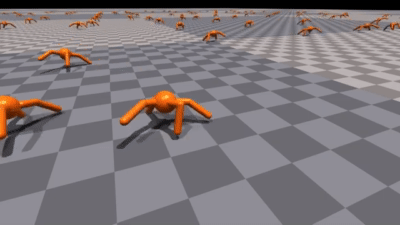
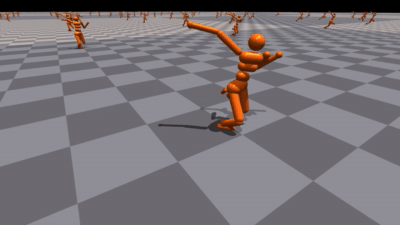
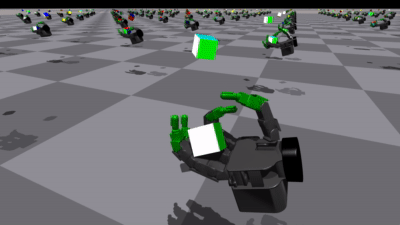
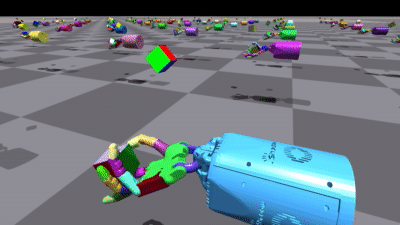
* [Dextreme](https://dextreme.org/)
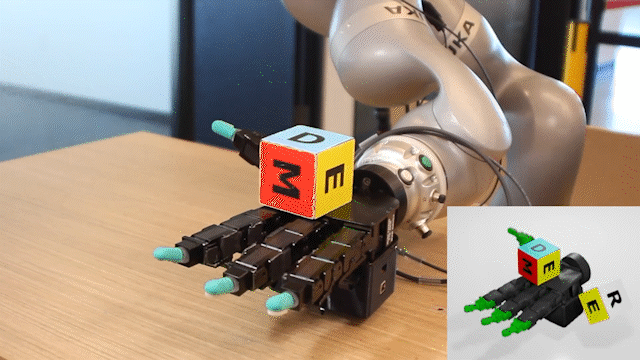
* [DexPBT](https://sites.google.com/view/dexpbt)

* [Starcraft 2 Multi Agents](docs/SMAC.md)
* [BRAX](docs/BRAX.md)
* [Mujoco Envpool](docs/MUJOCO_ENVPOOL.md)
* [DeepMind Envpool](docs/DEEPMIND_ENVPOOL.md)
* [Atari Envpool](docs/ATARI_ENVPOOL.md)
* [Random Envs](docs/OTHER.md)
Implemented in Pytorch:
* PPO with the support of asymmetric actor-critic variant
* Support of end-to-end GPU accelerated training pipeline with Isaac Gym and Brax
* Masked actions support
* Multi-agent training, decentralized and centralized critic variants
* Self-play
Implemented in Tensorflow 1.x (was removed in this version):
* Rainbow DQN
* A2C
* PPO
## Quickstart: Colab in the Cloud
Explore RL Games quick and easily in colab notebooks:
* [Mujoco training](https://colab.research.google.com/github/Denys88/rl_games/blob/master/notebooks/mujoco_envpool_training.ipynb) Mujoco envpool training example.
* [Brax training](https://colab.research.google.com/github/Denys88/rl_games/blob/master/notebooks/brax_training.ipynb) Brax training example, with keeping all the observations and actions on GPU.
* [Onnx discrete space export example with Cartpole](https://colab.research.google.com/github/Denys88/rl_games/blob/master/notebooks/train_and_export_onnx_example_discrete.ipynb) envpool training example.
* [Onnx continuous space export example with Pendulum](https://colab.research.google.com/github/Denys88/rl_games/blob/master/notebooks/train_and_export_onnx_example_continuous.ipynb) envpool training example.
* [Onnx continuous space with LSTM export example with Pendulum](https://colab.research.google.com/github/Denys88/rl_games/blob/master/notebooks/train_and_export_onnx_example_lstm_continuous.ipynb) envpool training example.
## Installation
For maximum training performance a preliminary installation of Pytorch 1.9+ with CUDA 11.1+ is highly recommended:
```conda install pytorch torchvision cudatoolkit=11.3 -c pytorch -c nvidia``` or:
```pip install torch==1.11.0+cu113 torchvision==0.12.0+cu113 -f https://download.pytorch.org/whl/cu113/torch_stable.html```
Then:
```pip install rl-games```
To run CPU-based environments either Ray or envpool are required ```pip install envpool``` or ```pip install ray```
To run Mujoco, Atari games or Box2d based environments training they need to be additionally installed with ```pip install gym[mujoco]```, ```pip install gym[atari]``` or ```pip install gym[box2d]``` respectively.
To run Atari also ```pip install opencv-python``` is required. In addition installation of envpool for maximum simulation and training perfromance of Mujoco and Atari environments is highly recommended: ```pip install envpool```
## Citing
If you use rl-games in your research please use the following citation:
```bibtex
@misc{rl-games2021,
title = {rl-games: A High-performance Framework for Reinforcement Learning},
author = {Makoviichuk, Denys and Makoviychuk, Viktor},
month = {May},
year = {2021},
publisher = {GitHub},
journal = {GitHub repository},
howpublished = {\url{https://github.com/Denys88/rl_games}},
}
```
## Development setup
```bash
poetry install
# install cuda related dependencies
poetry run pip install torch==1.11.0+cu113 torchvision==0.12.0+cu113 -f https://download.pytorch.org/whl/cu113/torch_stable.html
```
## Training
**NVIDIA Isaac Gym**
Download and follow the installation instructions of Isaac Gym: https://developer.nvidia.com/isaac-gym
And IsaacGymEnvs: https://github.com/NVIDIA-Omniverse/IsaacGymEnvs
*Ant*
```python train.py task=Ant headless=True```
```python train.py task=Ant test=True checkpoint=nn/Ant.pth num_envs=100```
*Humanoid*
```python train.py task=Humanoid headless=True```
```python train.py task=Humanoid test=True checkpoint=nn/Humanoid.pth num_envs=100```
*Shadow Hand block orientation task*
```python train.py task=ShadowHand headless=True```
```python train.py task=ShadowHand test=True checkpoint=nn/ShadowHand.pth num_envs=100```
**Other**
*Atari Pong*
```bash
poetry install -E atari
poetry run python runner.py --train --file rl_games/configs/atari/ppo_pong.yaml
poetry run python runner.py --play --file rl_games/configs/atari/ppo_pong.yaml --checkpoint nn/PongNoFrameskip.pth
```
*Brax Ant*
```bash
poetry install -E brax
poetry run pip install --upgrade "jax[cuda]==0.3.13" -f https://storage.googleapis.com/jax-releases/jax_releases.html
poetry run python runner.py --train --file rl_games/configs/brax/ppo_ant.yaml
poetry run python runner.py --play --file rl_games/configs/brax/ppo_ant.yaml --checkpoint runs/Ant_brax/nn/Ant_brax.pth
```
## Experiment tracking
rl_games support experiment tracking with [Weights and Biases](https://wandb.ai).
```bash
poetry install -E atari
poetry run python runner.py --train --file rl_games/configs/atari/ppo_breakout_torch.yaml --track
WANDB_API_KEY=xxxx poetry run python runner.py --train --file rl_games/configs/atari/ppo_breakout_torch.yaml --track
poetry run python runner.py --train --file rl_games/configs/atari/ppo_breakout_torch.yaml --wandb-project-name rl-games-special-test --track
poetry run python runner.py --train --file rl_games/configs/atari/ppo_breakout_torch.yaml --wandb-project-name rl-games-special-test -wandb-entity openrlbenchmark --track
```
## Multi GPU
We use `torchrun` to orchestrate any multi-gpu runs.
```bash
torchrun --standalone --nnodes=1 --nproc_per_node=2 runner.py --train --file rl_games/configs/ppo_cartpole.yaml
```
## Config Parameters
| Field | Example Value | Default | Description |
| ---------------------- | ------------------------- | ------- | ------------------------------------------------------------------------------------------------------------------------------------------------------------ |
| seed | 8 | None | Seed for pytorch, numpy etc. |
| algo | | | Algorithm block. |
| name | a2c_continuous | None | Algorithm name. Possible values are: sac, a2c_discrete, a2c_continuous |
| model | | | Model block. |
| name | continuous_a2c_logstd | None | Possible values: continuous_a2c ( expects sigma to be (0, +inf), continuous_a2c_logstd ( expects sigma to be (-inf, +inf), a2c_discrete, a2c_multi_discrete |
| network | | | Network description. |
| name | actor_critic | | Possible values: actor_critic or soft_actor_critic. |
| separate | False | | Whether use or not separate network with same same architecture for critic. In almost all cases if you normalize value it is better to have it False |
| space | | | Network space |
| continuous | | | continuous or discrete |
| mu_activation | None | | Activation for mu. In almost all cases None works the best, but we may try tanh. |
| sigma_activation | None | | Activation for sigma. Will be threated as log(sigma) or sigma depending on model. |
| mu_init | | | Initializer for mu. |
| name | default | | |
| sigma_init | | | Initializer for sigma. if you are using logstd model good value is 0. |
| name | const_initializer | | |
| val | 0 | | |
| fixed_sigma | True | | If true then sigma vector doesn't depend on input. |
| cnn | | | Convolution block. |
| type | conv2d | | Type: right now two types supported: conv2d or conv1d |
| activation | elu | | activation between conv layers. |
| initializer | | | Initialier. I took some names from the tensorflow. |
| name | glorot_normal_initializer | | Initializer name |
| gain | 1.4142 | | Additional parameter. |
| convs | | | Convolution layers. Same parameters as we have in torch. |
| filters | 32 | | Number of filters. |
| kernel_size | 8 | | Kernel size. |
| strides | 4 | | Strides |
| padding | 0 | | Padding |
| filters | 64 | | Next convolution layer info. |
| kernel_size | 4 | | |
| strides | 2 | | |
| padding | 0 | | |
| filters | 64 | | |
| kernel_size | 3 | | |
| strides | 1 | | |
| padding | 0 | |
| mlp | | | MLP Block. Convolution is supported too. See other config examples. |
| units | | | Array of sizes of the MLP layers, for example: [512, 256, 128] |
| d2rl | False | | Use d2rl architecture from https://arxiv.org/abs/2010.09163. |
| activation | elu | | Activations between dense layers. |
| initializer | | | Initializer. |
| name | default | | Initializer name. |
| rnn | | | RNN block. |
| name | lstm | | RNN Layer name. lstm and gru are supported. |
| units | 256 | | Number of units. |
| layers | 1 | | Number of layers |
| before_mlp | False | False | Apply rnn before mlp block or not. |
| config | | | RL Config block. |
| reward_shaper | | | Reward Shaper. Can apply simple transformations. |
| min_val | -1 | | You can apply min_val, max_val, scale and shift. |
| scale_value | 0.1 | 1 | |
| normalize_advantage | True | True | Normalize Advantage. |
| gamma | 0.995 | | Reward Discount |
| tau | 0.95 | | Lambda for GAE. Called tau by mistake long time ago because lambda is keyword in python :( |
| learning_rate | 3e-4 | | Learning rate. |
| name | walker | | Name which will be used in tensorboard. |
| save_best_after | 10 | | How many epochs to wait before start saving checkpoint with best score. |
| score_to_win | 300 | | If score is >=value then this value training will stop. |
| grad_norm | 1.5 | | Grad norm. Applied if truncate_grads is True. Good value is in (1.0, 10.0) |
| entropy_coef | 0 | | Entropy coefficient. Good value for continuous space is 0. For discrete is 0.02 |
| truncate_grads | True | | Apply truncate grads or not. It stabilizes training. |
| env_name | BipedalWalker-v3 | | Envinronment name. |
| e_clip | 0.2 | | clip parameter for ppo loss. |
| clip_value | False | | Apply clip to the value loss. If you are using normalize_value you don't need it. |
| num_actors | 16 | | Number of running actors/environments. |
| horizon_length | 4096 | | Horizon length per each actor. Total number of steps will be num_actors*horizon_length * num_agents (if env is not MA num_agents==1). |
| minibatch_size | 8192 | | Minibatch size. Total number number of steps must be divisible by minibatch size. |
| minibatch_size_per_env | 8 | | Minibatch size per env. If specified will overwrite total number number the default minibatch size with minibatch_size_per_env * nume_envs value. |
| mini_epochs | 4 | | Number of miniepochs. Good value is in [1,10] |
| critic_coef | 2 | | Critic coef. by default critic_loss = critic_coef * 1/2 * MSE. |
| lr_schedule | adaptive | None | Scheduler type. Could be None, linear or adaptive. Adaptive is the best for continuous control tasks. Learning rate is changed changed every miniepoch |
| kl_threshold | 0.008 | | KL threshould for adaptive schedule. if KL < kl_threshold/2 lr = lr * 1.5 and opposite. |
| normalize_input | True | | Apply running mean std for input. |
| bounds_loss_coef | 0.0 | | Coefficient to the auxiary loss for continuous space. |
| max_epochs | 10000 | | Maximum number of epochs to run. |
| max_frames | 5000000 | | Maximum number of frames (env steps) to run. |
| normalize_value | True | | Use value running mean std normalization. |
| use_diagnostics | True | | Adds more information into the tensorboard. |
| value_bootstrap | True | | Bootstraping value when episode is finished. Very useful for different locomotion envs. |
| bound_loss_type | regularisation | None | Adds aux loss for continuous case. 'regularisation' is the sum of sqaured actions. 'bound' is the sum of actions higher than 1.1. |
| bounds_loss_coef | 0.0005 | 0 | Regularisation coefficient |
| use_smooth_clamp | False | | Use smooth clamp instead of regular for cliping |
| zero_rnn_on_done | False | True | If False RNN internal state is not reset (set to 0) when an environment is rest. Could improve training in some cases, for example when domain randomization is on |
| player | | | Player configuration block. |
| render | True | False | Render environment |
| deterministic | True | True | Use deterministic policy ( argmax or mu) or stochastic. |
| use_vecenv | True | False | Use vecenv to create environment for player |
| games_num | 200 | | Number of games to run in the player mode. |
| env_config | | | Env configuration block. It goes directly to the environment. This example was take for my atari wrapper. |
| skip | 4 | | Number of frames to skip |
| name | BreakoutNoFrameskip-v4 | | The exact name of an (atari) gym env. An example, depends on the training env this parameters can be different. |
| evaluation | True | False | Enables the evaluation feature for inferencing while training. |
| update_checkpoint_freq | 100 | 100 | Frequency in number of steps to look for new checkpoints. |
| dir_to_monitor | | | Directory to search for checkpoints in during evaluation. |
## Custom network example:
[simple test network](rl_games/envs/test_network.py)
This network takes dictionary observation.
To register it you can add code in your __init__.py
```
from rl_games.envs.test_network import TestNetBuilder
from rl_games.algos_torch import model_builder
model_builder.register_network('testnet', TestNetBuilder)
```
[simple test environment](rl_games/envs/test/rnn_env.py)
[example environment](rl_games/envs/test/example_env.py)
Additional environment supported properties and functions
| Field | Default Value | Description |
| -------------------------- | ------------- | -------------------------------------------------------------------------------------------------------------------------------------------------------------------------------------------------------- |
| use_central_value | False | If true than returned obs is expected to be dict with 'obs' and 'state' |
| value_size | 1 | Shape of the returned rewards. Network wil support multihead value automatically. |
| concat_infos | False | Should default vecenv convert list of dicts to the dicts of lists. Very usefull if you want to use value_boostrapping. in this case you need to always return 'time_outs' : True or False, from the env. |
| get_number_of_agents(self) | 1 | Returns number of agents in the environment |
| has_action_mask(self) | False | Returns True if environment has invalid actions mask. |
| get_action_mask(self) | None | Returns action masks if has_action_mask is true. Good example is [SMAC Env](rl_games/envs/test/smac_env.py) |
## Release Notes
1.6.1
* Fixed Central Value RNN bug which occurs if you train ma multi agent environment.
* Added Deepmind Control PPO benchmark.
* Added a few more experimental ways to train value prediction (OneHot, TwoHot encoding and crossentropy loss instead of L2).
* New methods didn't. It is impossible to turn it on from the yaml files. Once we find an env which trains better it will be added to the config.
* Added shaped reward graph to the tensorboard.
* Fixed bug with SAC not saving weights with save_frequency.
* Added multi-node training support for GPU-accelerated training environments like Isaac Gym. No changes in training scripts are required. Thanks to @ankurhanda and @ArthurAllshire for assistance in implementation.
* Added evaluation feature for inferencing during training. Checkpoints from training process can be automatically picked up and updated in the inferencing process when enabled.
* Added get/set API for runtime update of rl training parameters. Thanks to @ArthurAllshire for the initial version of fast PBT code.
* Fixed SAC not loading weights properly.
* Removed Ray dependency for use cases it's not required.
* Added warning for using deprecated 'seq_len' instead of 'seq_length' in configs with RNN networks.
1.6.0
* Added ONNX export colab example for discrete and continious action spaces. For continuous case LSTM policy example is provided as well.
* Improved RNNs training in continuous space, added option `zero_rnn_on_done`.
* Added NVIDIA CuLE support: https://github.com/NVlabs/cule
* Added player config everride. Vecenv is used for inference.
* Fixed multi-gpu training with central value.
* Fixed max_frames termination condition, and it's interaction with the linear learning rate: https://github.com/Denys88/rl_games/issues/212
* Fixed "deterministic" misspelling issue.
* Fixed Mujoco and Brax SAC configs.
* Fixed multiagent envs statistics reporting. Fixed Starcraft2 SMAC environments.
1.5.2
* Added observation normalization to the SAC.
* Returned back adaptive KL legacy mode.
1.5.1
* Fixed build package issue.
1.5.0
* Added wandb support.
* Added poetry support.
* Fixed various bugs.
* Fixed cnn input was not divided by 255 in case of the dictionary obs.
* Added more envpool mujoco and atari training examples. Some of the results: 15 min Mujoco humanoid training, 2 min atari pong.
* Added Brax and Mujoco colab training examples.
* Added 'seed' command line parameter. Will override seed in config in case it's > 0.
* Deprecated `horovod` in favor of `torch.distributed` ([#171](https://github.com/Denys88/rl_games/pull/171)).
1.4.0
* Added discord channel https://discord.gg/hnYRq7DsQh :)
* Added envpool support with a few atari examples. Works 3-4x time faster than ray.
* Added mujoco results. Much better than openai spinning up ppo results.
* Added tcnn(https://github.com/NVlabs/tiny-cuda-nn) support. Reduces 5-10% of training time in the IsaacGym envs.
* Various fixes and improvements.
1.3.2
* Added 'sigma' command line parameter. Will override sigma for continuous space in case if fixed_sigma is True.
1.3.1
* Fixed SAC not working
1.3.0
* Simplified rnn implementation. Works a little bit slower but much more stable.
* Now central value can be non-rnn if policy is rnn.
* Removed load_checkpoint from the yaml file. now --checkpoint works for both train and play.
1.2.0
* Added Swish (SILU) and GELU activations, it can improve Isaac Gym results for some of the envs.
* Removed tensorflow and made initial cleanup of the old/unused code.
* Simplified runner.
* Now networks are created in the algos with load_network method.
1.1.4
* Fixed crash in a play (test) mode in player, when simulation and rl_devices are not the same.
* Fixed variuos multi gpu errors.
1.1.3
* Fixed crash when running single Isaac Gym environment in a play (test) mode.
* Added config parameter ```clip_actions``` for switching off internal action clipping and rescaling
1.1.0
* Added to pypi: ```pip install rl-games```
* Added reporting env (sim) step fps, without policy inference. Improved naming.
* Renames in yaml config for better readability: steps_num to horizon_length amd lr_threshold to kl_threshold
## Troubleshouting
* Some of the supported envs are not installed with setup.py, you need to manually install them
* Starting from rl-games 1.1.0 old yaml configs won't be compatible with the new version:
* ```steps_num``` should be changed to ```horizon_length``` amd ```lr_threshold``` to ```kl_threshold```
## Known issues
* Running a single environment with Isaac Gym can cause crash, if it happens switch to at least 2 environments simulated in parallel